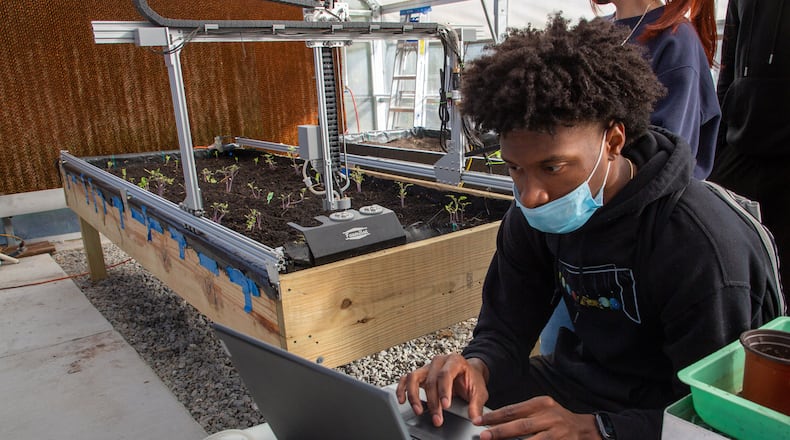On a chilly, clear morning earlier this month, 17-year-old Shaun Patterson worked on a laptop in the spacious new greenhouse outside Archer High School, trying to get a robot to farm.
If Patterson could get the robotic arm to work, it could cultivate greens, potatoes and squash for future Thanksgivings.
The scene illustrated the tech-heavy nature of new agriculture programs at Archer and two other Gwinnett County high schools.
Gwinnett County Public Schools decided to expand the curriculum after looking at workforce data and seeing that agriculture is one of the largest industries in Georgia, said Tim Hemans, the school district’s executive director of career and technical education. District leaders also observed a shift in the industry.
“Ag companies are telling us they see themselves as more of a tech company,” Hemans said.
As climate change becomes an increasingly urgent problem, the new agriculture lessons also focus on conservation and sustainable farming, Hemans said.
Although Archer High sits in a less-developed area of eastern Gwinnett, the thoroughly suburban students are not from farming families, said Eric Stoker, the science, technology, engineering and math coordinator.
“Kids might have some home gardening experience at most,” Stoker said.
Archer began offering basic agricultural science this year, with plans to add the two other courses that complete the Georgia education department’s career pathway in environmental agriculture systems.
About 80 students are pursuing the agriculture course sequence, Principal Ken Johnson said, but the school combined the agriculture class with other science and engineering electives to create the “Ag STEM” program.
Other core subjects, such as social studies and English, include agricultural themes, Johnson said. Students in family and consumer science — formerly known as home economics — will learn to cook the vegetables from the school gardens, Johnson said.
Elementary schools that feed into Archer have begun raising chickens, growing vegetables and experimenting with hydroponics, a method of growing plants without soil.
The agriculture lessons teach problem-solving and teamwork — skills that students will find useful in any career, Johnson said.
Brookwood and Grayson High Schools already offered basic agriculture science but this year added more courses under the forestry and natural resources career pathway. All three high schools this year started FFA agricultural clubs.
Some other metro Atlanta school districts offer agriculture education to their urban and suburban youth.
Booker T. Washington High School in Atlanta is capitalizing on the history of its namesake, who founded what is now Tuskegee University to improve agricultural methods in rural Alabama. The high school has an Ag STEM program and offers an aquaculture pathway.
The DeKalb County School District offers horticulture, forest science and agriscience career pathways and many schools have gardens. The Fernbank Science Center also gives agricultural lessons to students of all ages.
The Fulton school district offers several agricultural pathways and more than 1,000 students participate in FFA, according to Anne Hampson Boatwright, a spokeswoman.
Archer High built its greenhouse with a $100,000 innovation grant from the Gwinnett school district, Johnson said. The Hines Family Foundation donated the money for the FarmBot, said Stoker.
Aquaponics systems, which raise plants and fish together in a symbiotic relationship, line the greenhouse and a corner of a classroom in the school building. Students designed and built the systems and are analyzing which work best.
Students recently planted greens in grow beds they’d built outside the greenhouse, while inside, Patterson wrangled with the FarmBot.
Credit: Steve Schaefer
Credit: Steve Schaefer
A senior, he applied early to Georgia Tech, where he wants to study mechanical engineering. Before this fall, his agricultural experience was limited to helping his mother grow vegetables as a pandemic hobby.
“I’ve gotten interested in the agriculture part of engineering,” Patterson said. “That feels good, helping out the community.”
Students are planning to start a farmers market and plant sale in the spring, teaching them entrepreneurship, Stoker said. Engineering classes this month worked on picnic tables and cornhole boards to sell. They will use lumber prices to calculate their costs and estimate profits, Stoker said.
Katrina Houk, a 17-year-old senior, has taken engineering classes for all four years of high school and aspires to be an architect for Walt Disney World. She and her classmates said they learned an unexpected amount this year about fish.
“There are a lot of things to take into account,” Houk said.
New agriculture career and technical programs at Gwinnett high schools
Archer High School
Pathway: Environmental Agriculture Systems
2021-22 Courses Offered: Basic Agricultural Science
Brookwood High School
Pathway: Forestry/Natural Resources
2021-22 Courses Offered: Basic Agricultural Science, Forest Science, Natural Resources Management
Grayson High School
Pathway: Forestry/Natural Resources
2021-22 Courses Offered: Basic Agricultural Science, Natural Resources Management
About the Author
Keep Reading
The Latest
Featured



